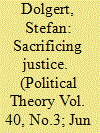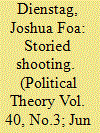| Srl | Item |
| 1 |
ID:
113827


|
|
|
|
|
| Publication |
2012.
|
| Summary/Abstract |
Democratic theorists have increasingly turned to Aeschylus' Oresteia as a resource for challenging the shortcomings of liberal theory, but I argue that this particular return to Greek tragedy should be treated with a healthy dose of skepticism. Defenders of Aeschylean justice have underplayed the sacrificial aspects of his solution to the problem of civil strife, mistaking the consent of the Furies for a resolution that escapes the cycle of violence. Drawing on elements of Greek ritual practice, I contend that Aeschylus folds the consent of the Furies into a sacrificial framework which denies the violence it enacts by directing this violence toward nonhumans. As a consequence Aeschylean justice is complicit in continuing the sacrificial economy it seems to subvert, and Aeschylean politics relies on the suffering of nonhumans (and humans) to secure its conception of order.
|
|
|
|
|
|
|
|
|
|
|
|
|
|
|
|
| 2 |
ID:
113830


|
|
|
|
|
| Publication |
2012.
|
| Summary/Abstract |
This article examines Friedrich Engels's little noticed communitarian sympathies, especially as expressed in his 1844 article 'kommunistischen Ansiedlungen'. These sympathies are in conflict with the considered and more critical view of communitarian socialism that he subsequently came to share with Karl Marx. I have four ambitions in the article: first, to provide some characterisation of this 'communitarian moment' in Engels's early intellectual evolution; second, to raise a number of worries about the argument of this particular article; third, to illuminate some of the interesting variety in nineteenth-century communitarianism; and fourth, to insist on the complexity of questions about 'feasibility'. I maintain that Engels underestimates the variety of contemporary communitarianism, and that his appeal to the existence of intentional communities in America and Britain as proof of the feasibility of communism is unsuccessful.
|
|
|
|
|
|
|
|
|
|
|
|
|
|
|
|
| 3 |
ID:
113829


|
|
|
|
|
| Publication |
2012.
|
| Summary/Abstract |
Some scholars have argued that religiously injurious speech poses a serious problem for secular liberal thought. It has been suggested that secular liberal thought and political practice often misrecognize the nature of the injury involved in speech that violates the sacred and that much secular thought about religious injury (and free exercise more generally) is premised on unacknowledged Protestant conceptions of what real religion is. In this essay, I argue against the ideas that secular liberalism tends to treat religion only as a matter of freely chosen belief and that the unchosen, habituated nature of much religious experience raises a problem for the defense of speech that violates the sacred. I argue that secular thought and practice should remain very concerned about the social and political harms of speech directed unambiguously at social groups but need not eliminate the gap between religious attachments and religious persons.
|
|
|
|
|
|
|
|
|
|
|
|
|
|
|
|
| 4 |
ID:
113828


|
|
|
|
|
| Publication |
2012.
|
| Summary/Abstract |
A variety of theorists have emphasized the paradox at the center of democratic legal authority, viz., that it cannot be self-derived but must ultimately rest on some extra-legal phenomenon, usually an act of exclusion. John Ford's The Man Who Shot Liberty Valance examines precisely this paradoxical situation and, I argue, actually suggests a novel response that has escaped theorists who have considered the problem in the past. The film's best-known line ("print the legend") in fact represents the opposite of its perspective-which is to carefully deconstruct and reveal (without debunking) the complicated interrelation of law and power in the formation of any state. Rather than undermining democratic authority, we can be strengthened, if sobered, by the revelation that law is not self-sustaining. By setting the facts alongside the legend, the film perpetuates the fortuitous moment of state formation. What constitutes the state, then, is neither law nor power, but rather the matrix of representation that creates the relationship between them-here a film, but perhaps, more generally, a sustaining narrative.
|
|
|
|
|
|
|
|
|
|
|
|
|
|
|
|